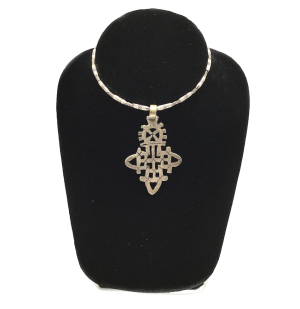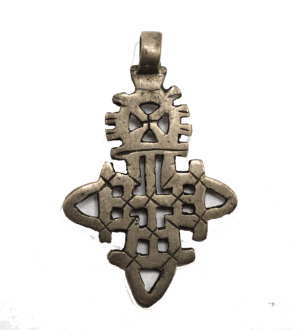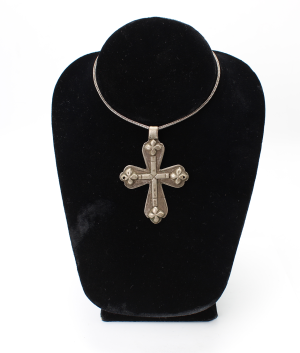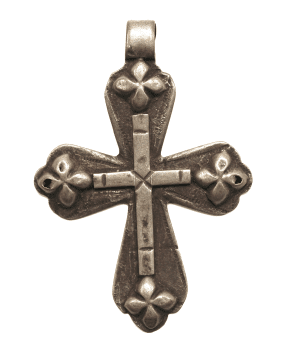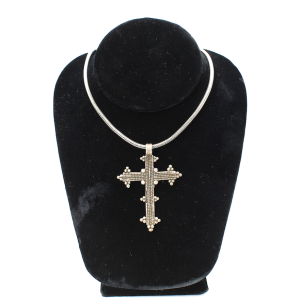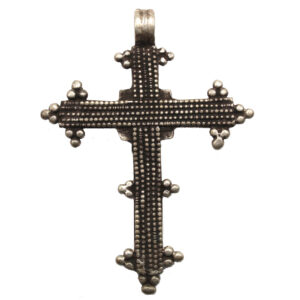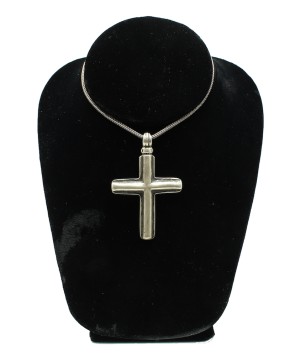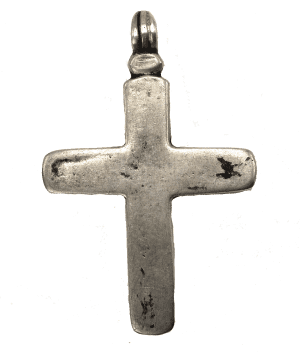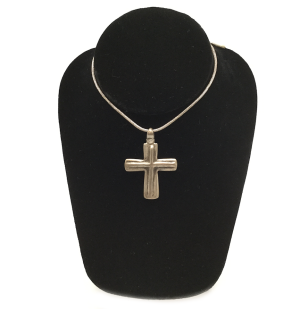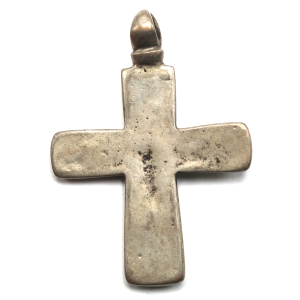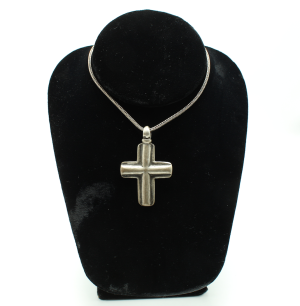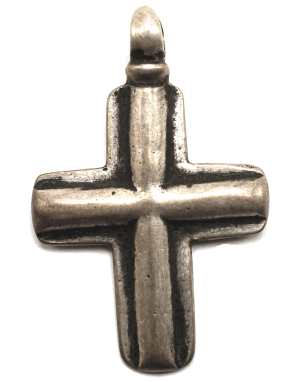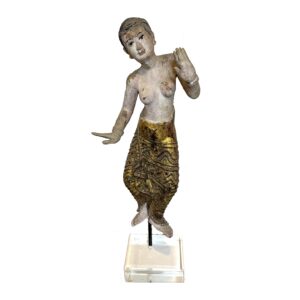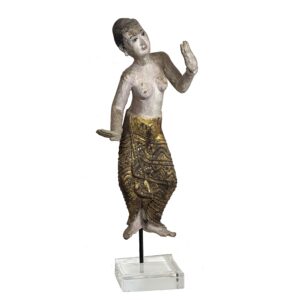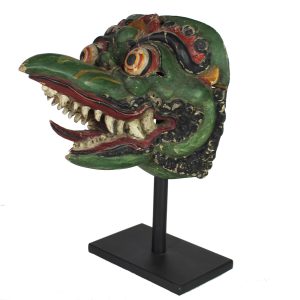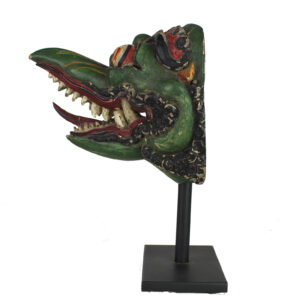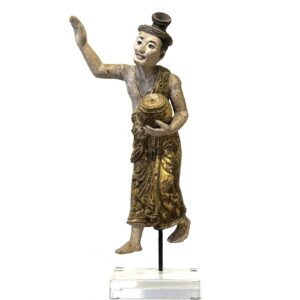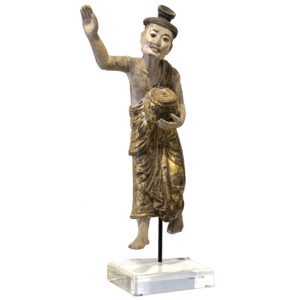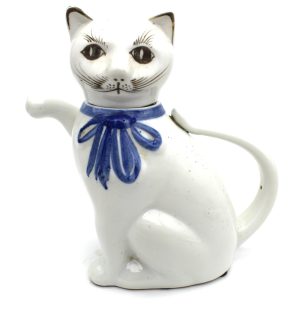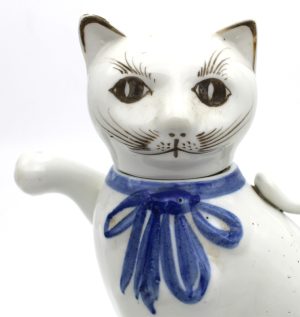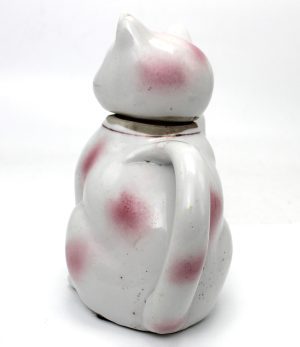Showing 205–216 of 434 results
-
Sale!


$135.00 Original price was: $135.00.$115.00Current price is: $115.00.
H: 2.75” W: 1.625″ | FREE SHIPPING WITHIN CONTINENTAL U.S.
Cross displaying distinctive tri-partite Coptic cross design with rounded horizontal arms and bottom symbolizing the Trinity. The partial circle symbolize eternity and is an apotropaic symbol to avert the “evil eye.”
-
Sale!


$275.00 Original price was: $275.00.$220.00Current price is: $220.00.
H: 2.75″ W: 1.75 ” | FREE SHIPPING WITHIN CONTINENTAL U.S.
Antique/vintage coin silver Fleury Cross centered with raised Latin Cross with bordered edge. Three florals trefoil lobes at the arms symbolize the Holy Trinity, new growth and renewal of life. Lost wax, one-of-a-kind.
-
Sale!


$175.00 Original price was: $175.00.$150.00Current price is: $150.00.
Ht: 2.375″ W: 1.937″ | FREE SHIPPING WITHIN CONTINENTAL U.S.
This magnificent antique/vintage coin silver Ethiopian Fleury Cross with arms in 3 pointed lobes and tri-part decorative designs represents the Trinity. Attached small granulates added after lost wax process creates a wonderful textured surface
-
Sale!


$195.00 Original price was: $195.00.$165.00Current price is: $165.00.
Ht: 2.75″ W: 1.81″ | FREE SHIPPING WITHIN CONTINENTAL U.S.
Elegant, large and heavy Latin Cross pendant with a raised rounded cross in the center and soft patina.
-
Sale!


$175.00 Original price was: $175.00.$150.00Current price is: $150.00.
Ht: 2.125″ W: 1.5″ | FREE SHIPPING WITHIN CONTINENTAL U.S.
Elegant Ethiopian Latin Cross with a raised rounded cross in center. Soft edges and matted surface from wear impart feeling of grace and warmth. Made using lost-wax, it is one-of-a-kind. Chain not included.
-
Sale!


$175.00 Original price was: $175.00.$150.00Current price is: $150.00.
Ht: 2.375 W: 1.5″ | FREE SHIPPING WITHIN CONTINENTAL U.S.
Simple Latin cross surmounted by a raised rounded cross in the center. Although it is heavy with a distinct and massive feel, its soft edges and matted surface impart a feeling of grace and warmth. Unadorned Latin crosses are relatively rare.
-
Sale!


$1,175.00 Original price was: $1,175.00.$750.00Current price is: $750.00.
H: 22″ W: 8.5″ D: 6.5″ | CALL 213-568-3030 OR EMAIL [email protected] FOR SHIPPING.
Decorative and charming wood provincial Burmese female dancer with bare top and gilded Burmese sarong with inset glass and sequins. Set high on a transparent Lucite base, she appears to float in motion.
-
Sale!


$775.00 Original price was: $775.00.$675.00Current price is: $675.00.
H: 13.75″ W: 3″. D: 3.75″ | CALL 213-568-3030 OR EMAIL [email protected] FOR SHIPPING.
Featured in the original Spiderman movie, this rare vintage Balinese mask of Jatayu was used in Ramayana performances. He is the Hindu vehicle of Vishnu, one of the principal Hindu Gods triad. On a museum quality stand.
-
Sale!


$625.00 Original price was: $625.00.$425.00Current price is: $425.00.
H: 8.25″ W: 3.125″ D: 2.25″ | FREE SHIPPING!
This Kitchen God and his Wife is posed as streamlined virtual mirror-images and fashioned with a general quality relying on paint rather than deep carving for details. They sit on backless chairs on a plinth, with simplified gold officials’ robes with long color sashes, and well-carved black and gilt head gear. The wife’s face is smooth, generalized and the male face has a more deeply carved surface and painted highlights.
-
Sale!


$1,175.00 Original price was: $1,175.00.$750.00Current price is: $750.00.
H: 22″ W: 8.5″ D: 6.5″ | CALL 213-568-3030 OR EMAIL [email protected] FOR SHIPPING.
Lyrical wood provincial Burmese male dancer with drum in gilded Burmese sarong with glass and sequins. Set high on a transparent Lucite base, he appears to float in motion.
-
Sale!


$145.00 Original price was: $145.00.$125.00Current price is: $125.00.
H: 7” W: 7” D: 3.5” | FREE SHIPPING IN CONTINENTAL US
Porcelain cat teapot removable head, sinuous tail handle. Beautifully hand-painted whimsical ribbon-like blue collar, dangling ornamental bow, and the black accents. Likely Qing Dynasty circa 1900-1920.
-
Sale!


$135.00 Original price was: $135.00.$115.00Current price is: $115.00.
H: 5.5″ W: 3″ D: 3.375″ | FREE SHIPPING WITHIN CONTINENTAL U.S.
Antique porcelain teapot, removable head, tail handle, and spout paw. Hand painted design with ribbon-like gold collar and dangling ornamental bow symbolizing long life. Great gift, recommended for decorative use only.
End of content
End of content

